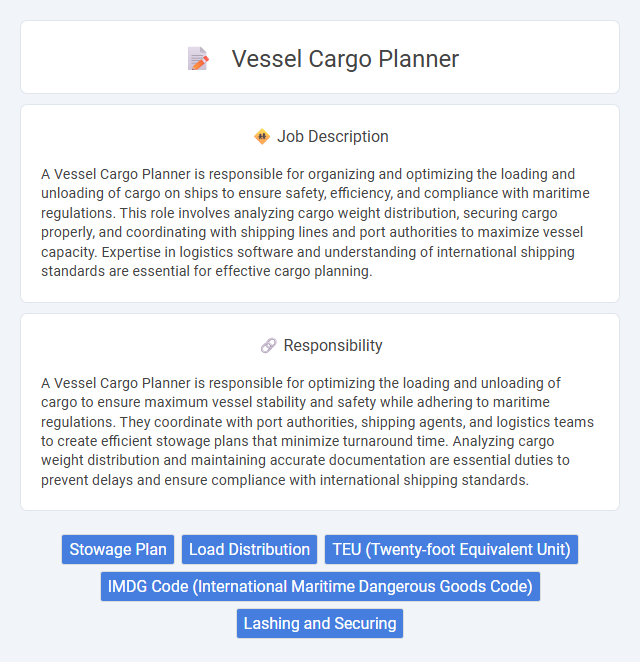
A Vessel Cargo Planner is responsible for organizing and optimizing the loading and unloading of cargo on ships to ensure safety, efficiency, and compliance with maritime regulations. This role involves analyzing cargo weight distribution, securing cargo properly, and coordinating with shipping lines and port authorities to maximize vessel capacity. Expertise in logistics software and understanding of international shipping standards are essential for effective cargo planning.
Individuals with strong organizational skills and the ability to work under pressure are likely suitable for a vessel cargo planner role. Those who excel in spatial awareness and problem-solving may find this job aligns well with their abilities. However, people who struggle with multitasking or have difficulty adapting to dynamic environments might face challenges in this position.
Qualification
A Vessel Cargo Planner must possess expertise in maritime logistics, cargo stowage principles, and safety regulations, often requiring a degree in logistics, maritime studies, or a related field. Proficiency in cargo planning software and strong analytical skills ensure optimal space utilization and compliance with weight distribution standards. Certification from recognized maritime authorities and comprehensive knowledge of international shipping protocols are essential for effective vessel cargo management.
Responsibility
A Vessel Cargo Planner is responsible for optimizing the loading and unloading of cargo to ensure maximum vessel stability and safety while adhering to maritime regulations. They coordinate with port authorities, shipping agents, and logistics teams to create efficient stowage plans that minimize turnaround time. Analyzing cargo weight distribution and maintaining accurate documentation are essential duties to prevent delays and ensure compliance with international shipping standards.
Benefit
A career as a vessel cargo planner probably offers substantial benefits including competitive salaries and opportunities for career advancement in the maritime industry. Employees may enjoy the advantage of working in dynamic environments that require strategic thinking and problem-solving skills. Benefits could also extend to comprehensive health packages and potential for global travel, enhancing both professional and personal experiences.
Challenge
The role of a vessel cargo planner likely involves complex logistical challenges, requiring precise coordination to optimize cargo load while ensuring safety and compliance with maritime regulations. There is a high probability that unexpected delays, shifting cargo specifications, and varying vessel capacities complicate the planning process, demanding quick problem-solving skills and adaptability. Managing these factors efficiently can significantly impact the vessel's operational success and overall supply chain effectiveness.
Career Advancement
A Vessel Cargo Planner career offers significant opportunities for professional growth by developing expertise in logistics, maritime operations, and supply chain management. Mastery of advanced shipping software and compliance with international regulations can lead to roles such as Senior Cargo Planner, Operations Manager, or Fleet Coordinator. Continuous learning and certification in maritime logistics enhance prospects for leadership positions within global shipping companies and port authorities.
Key Terms
Stowage Plan
A Vessel Cargo Planner specializes in creating detailed stowage plans that maximize ship stability, safety, and cargo accessibility while adhering to maritime regulations. The stowage plan involves precise weight distribution calculations, hazardous material segregation, and optimization of container stacking to prevent damage during transit. Expertise in computerized stowage software and real-time cargo tracking systems is essential for efficiency and minimizing port turnaround time.
Load Distribution
Vessel cargo planners specialize in optimizing load distribution to ensure the ship's stability, safety, and compliance with maritime regulations. Precise weight calculations and strategic placement of containers prevent structural stress and reduce the risk of shifting cargo during transit. Utilizing advanced software, these planners maximize cargo capacity while maintaining balance and minimizing fuel consumption.
TEU (Twenty-foot Equivalent Unit)
Vessel cargo planners optimize the loading and stowage of containers, ensuring maximum utilization of TEU capacity on container ships. They analyze cargo dimensions, weight distribution, and port rotation schedules to enhance shipping efficiency and maintain vessel stability. Expert knowledge of TEU measurement standards and real-time tracking software is essential for accurate cargo planning and operational safety.
IMDG Code (International Maritime Dangerous Goods Code)
A vessel cargo planner specializing in the IMDG Code ensures the safe and compliant stowage of hazardous materials aboard ships, adhering strictly to international regulations. This role requires detailed knowledge of classification, segregation, and labeling of dangerous goods to prevent accidents and ensure maritime safety. Proficiency in interpreting the IMDG Code helps optimize cargo distribution while maintaining regulatory compliance and operational efficiency.
Lashing and Securing
A Vessel Cargo Planner specializing in lashing and securing ensures the safe stowage and stability of cargo on ships by calculating optimal container placement and applying precise lashing techniques. This role requires expertise in weight distribution, cargo securing regulations, and use of securing equipment to prevent cargo shift during transit. Proficiency in cargo planning software and knowledge of international maritime safety standards like the SOLAS Convention are essential for minimizing risks and enhancing vessel safety.
 kuljobs.com
kuljobs.com